Mental Health, Social Policy and Legal: Week 5-8 Assignment
VerifiedAdded on 2023/01/16
|8
|1994
|50
Homework Assignment
AI Summary
This assignment solution delves into the multifaceted aspects of mental health, social policy, and legal frameworks. It begins by defining professions in the context of mental health service provision, exploring complexities faced by various mental health workers. The analysis extends to a clinical interview video, evaluating its strengths and suggesting improvements, while also exploring alternative assessment methods and required skills. The solution then examines Cognitive Behavioral Approaches (CBT) for psychological distress and a recovery-based approach for a case study. Furthermore, it addresses legal and ethical considerations, including the insanity plea and the validity of Keynesian theories in social work. The document is a comprehensive resource for understanding and addressing complex mental health challenges, offering valuable insights into policy, practice, and legal aspects of mental health.
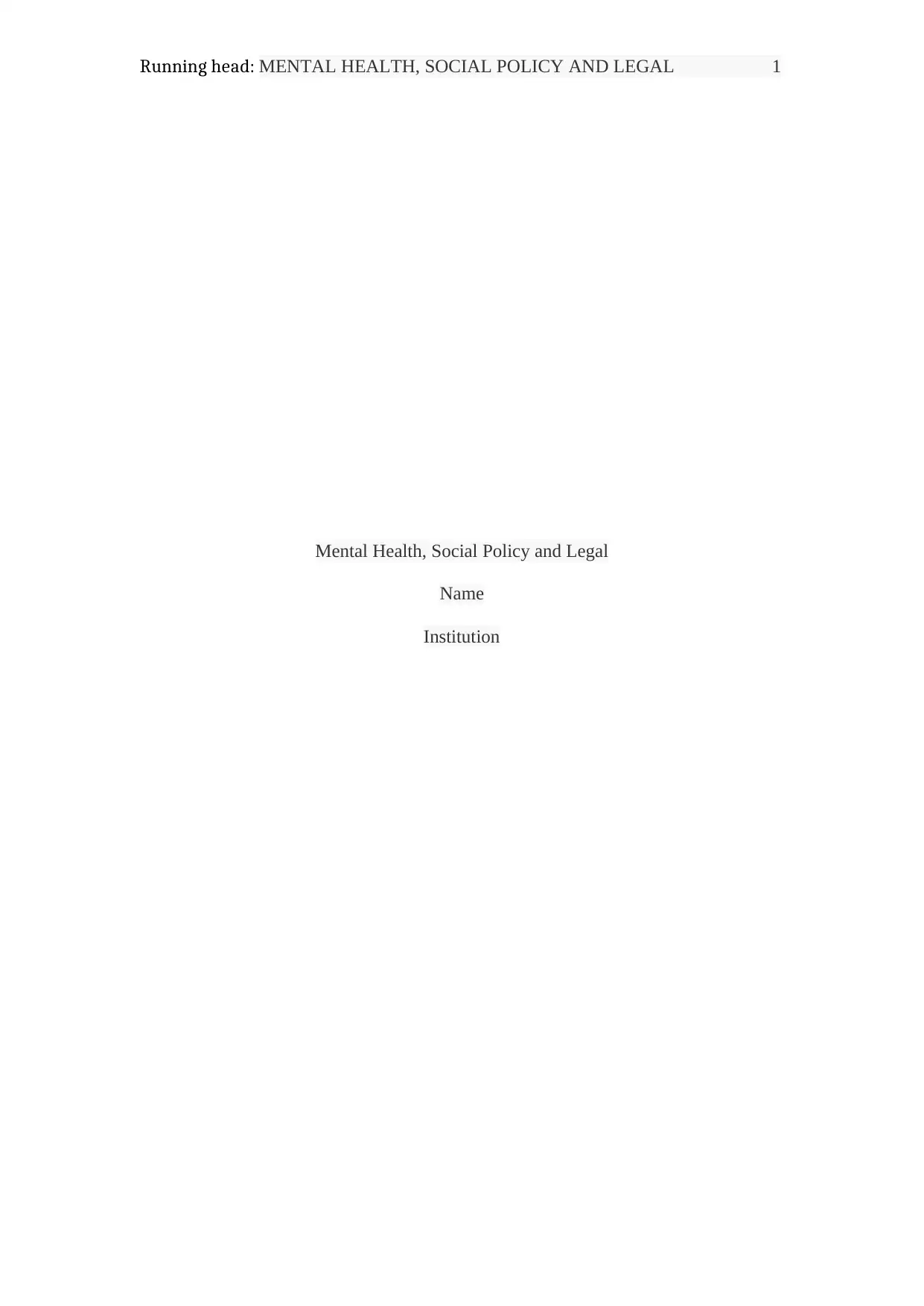
Running head: MENTAL HEALTH, SOCIAL POLICY AND LEGAL 1
Mental Health, Social Policy and Legal
Name
Institution
Mental Health, Social Policy and Legal
Name
Institution
Paraphrase This Document
Need a fresh take? Get an instant paraphrase of this document with our AI Paraphraser
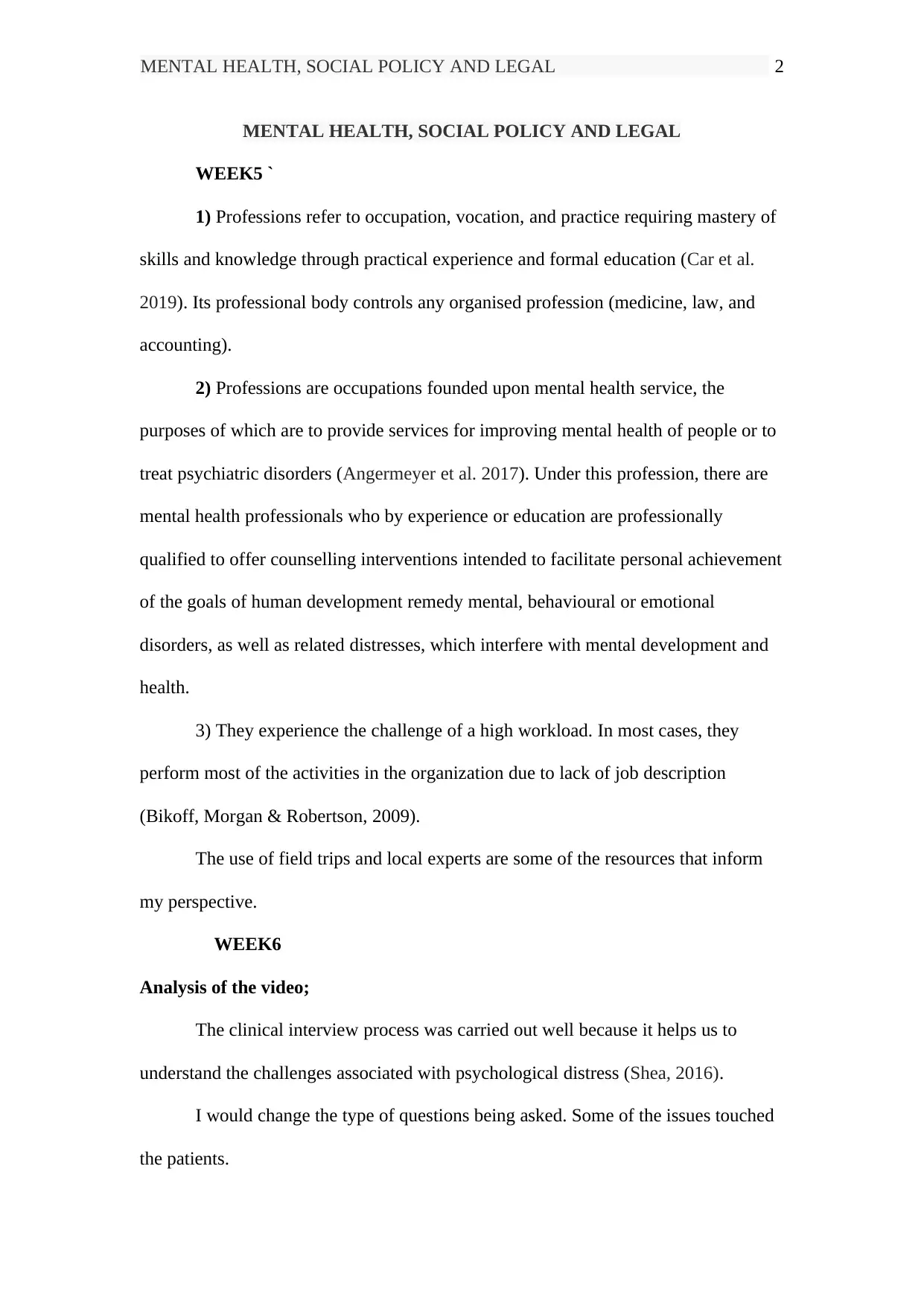
MENTAL HEALTH, SOCIAL POLICY AND LEGAL 2
MENTAL HEALTH, SOCIAL POLICY AND LEGAL
WEEK5 `
1) Professions refer to occupation, vocation, and practice requiring mastery of
skills and knowledge through practical experience and formal education (Car et al.
2019). Its professional body controls any organised profession (medicine, law, and
accounting).
2) Professions are occupations founded upon mental health service, the
purposes of which are to provide services for improving mental health of people or to
treat psychiatric disorders (Angermeyer et al. 2017). Under this profession, there are
mental health professionals who by experience or education are professionally
qualified to offer counselling interventions intended to facilitate personal achievement
of the goals of human development remedy mental, behavioural or emotional
disorders, as well as related distresses, which interfere with mental development and
health.
3) They experience the challenge of a high workload. In most cases, they
perform most of the activities in the organization due to lack of job description
(Bikoff, Morgan & Robertson, 2009).
The use of field trips and local experts are some of the resources that inform
my perspective.
WEEK6
Analysis of the video;
The clinical interview process was carried out well because it helps us to
understand the challenges associated with psychological distress (Shea, 2016).
I would change the type of questions being asked. Some of the issues touched
the patients.
MENTAL HEALTH, SOCIAL POLICY AND LEGAL
WEEK5 `
1) Professions refer to occupation, vocation, and practice requiring mastery of
skills and knowledge through practical experience and formal education (Car et al.
2019). Its professional body controls any organised profession (medicine, law, and
accounting).
2) Professions are occupations founded upon mental health service, the
purposes of which are to provide services for improving mental health of people or to
treat psychiatric disorders (Angermeyer et al. 2017). Under this profession, there are
mental health professionals who by experience or education are professionally
qualified to offer counselling interventions intended to facilitate personal achievement
of the goals of human development remedy mental, behavioural or emotional
disorders, as well as related distresses, which interfere with mental development and
health.
3) They experience the challenge of a high workload. In most cases, they
perform most of the activities in the organization due to lack of job description
(Bikoff, Morgan & Robertson, 2009).
The use of field trips and local experts are some of the resources that inform
my perspective.
WEEK6
Analysis of the video;
The clinical interview process was carried out well because it helps us to
understand the challenges associated with psychological distress (Shea, 2016).
I would change the type of questions being asked. Some of the issues touched
the patients.
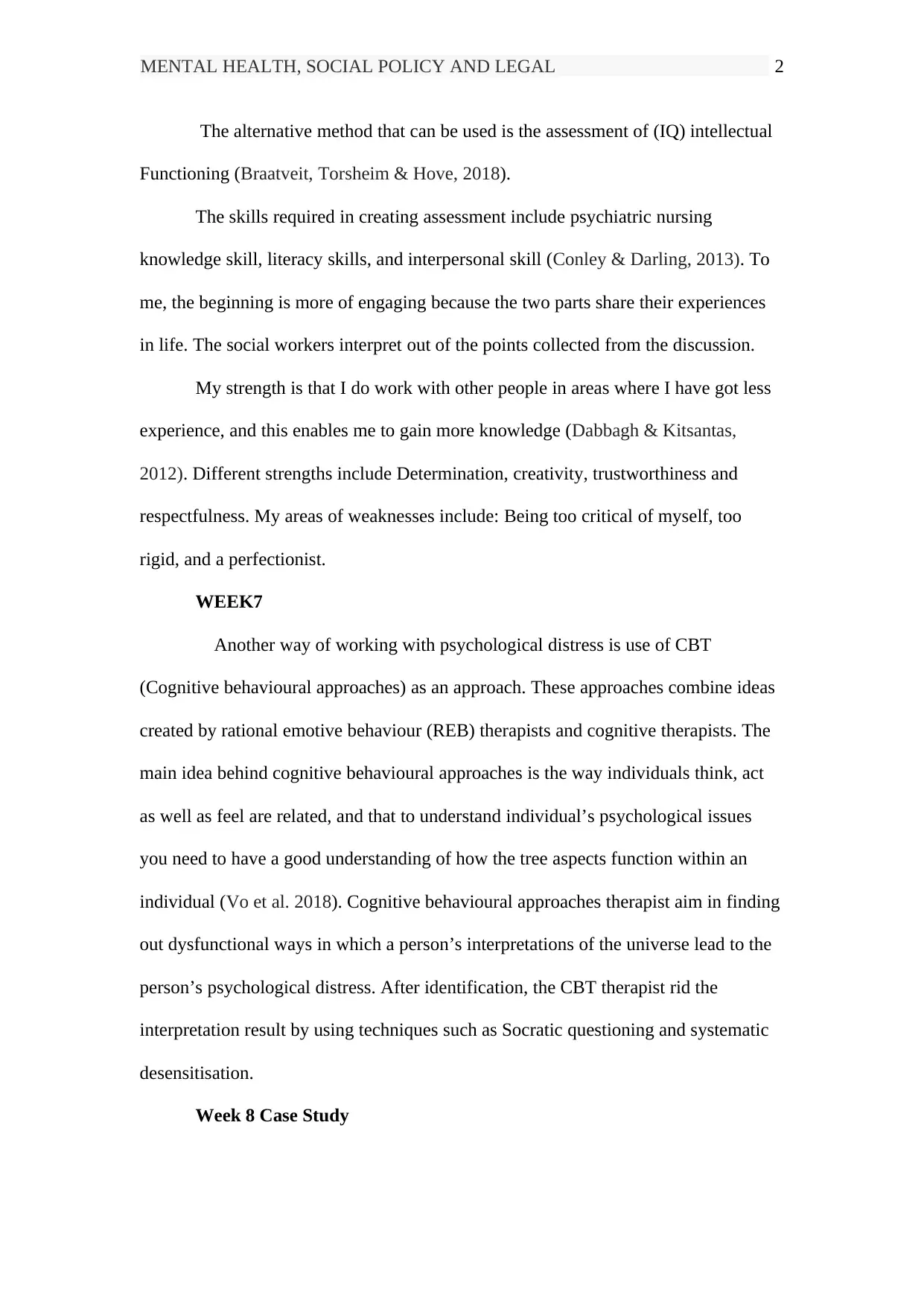
MENTAL HEALTH, SOCIAL POLICY AND LEGAL 2
The alternative method that can be used is the assessment of (IQ) intellectual
Functioning (Braatveit, Torsheim & Hove, 2018).
The skills required in creating assessment include psychiatric nursing
knowledge skill, literacy skills, and interpersonal skill (Conley & Darling, 2013). To
me, the beginning is more of engaging because the two parts share their experiences
in life. The social workers interpret out of the points collected from the discussion.
My strength is that I do work with other people in areas where I have got less
experience, and this enables me to gain more knowledge (Dabbagh & Kitsantas,
2012). Different strengths include Determination, creativity, trustworthiness and
respectfulness. My areas of weaknesses include: Being too critical of myself, too
rigid, and a perfectionist.
WEEK7
Another way of working with psychological distress is use of CBT
(Cognitive behavioural approaches) as an approach. These approaches combine ideas
created by rational emotive behaviour (REB) therapists and cognitive therapists. The
main idea behind cognitive behavioural approaches is the way individuals think, act
as well as feel are related, and that to understand individual’s psychological issues
you need to have a good understanding of how the tree aspects function within an
individual (Vo et al. 2018). Cognitive behavioural approaches therapist aim in finding
out dysfunctional ways in which a person’s interpretations of the universe lead to the
person’s psychological distress. After identification, the CBT therapist rid the
interpretation result by using techniques such as Socratic questioning and systematic
desensitisation.
Week 8 Case Study
The alternative method that can be used is the assessment of (IQ) intellectual
Functioning (Braatveit, Torsheim & Hove, 2018).
The skills required in creating assessment include psychiatric nursing
knowledge skill, literacy skills, and interpersonal skill (Conley & Darling, 2013). To
me, the beginning is more of engaging because the two parts share their experiences
in life. The social workers interpret out of the points collected from the discussion.
My strength is that I do work with other people in areas where I have got less
experience, and this enables me to gain more knowledge (Dabbagh & Kitsantas,
2012). Different strengths include Determination, creativity, trustworthiness and
respectfulness. My areas of weaknesses include: Being too critical of myself, too
rigid, and a perfectionist.
WEEK7
Another way of working with psychological distress is use of CBT
(Cognitive behavioural approaches) as an approach. These approaches combine ideas
created by rational emotive behaviour (REB) therapists and cognitive therapists. The
main idea behind cognitive behavioural approaches is the way individuals think, act
as well as feel are related, and that to understand individual’s psychological issues
you need to have a good understanding of how the tree aspects function within an
individual (Vo et al. 2018). Cognitive behavioural approaches therapist aim in finding
out dysfunctional ways in which a person’s interpretations of the universe lead to the
person’s psychological distress. After identification, the CBT therapist rid the
interpretation result by using techniques such as Socratic questioning and systematic
desensitisation.
Week 8 Case Study
⊘ This is a preview!⊘
Do you want full access?
Subscribe today to unlock all pages.

Trusted by 1+ million students worldwide
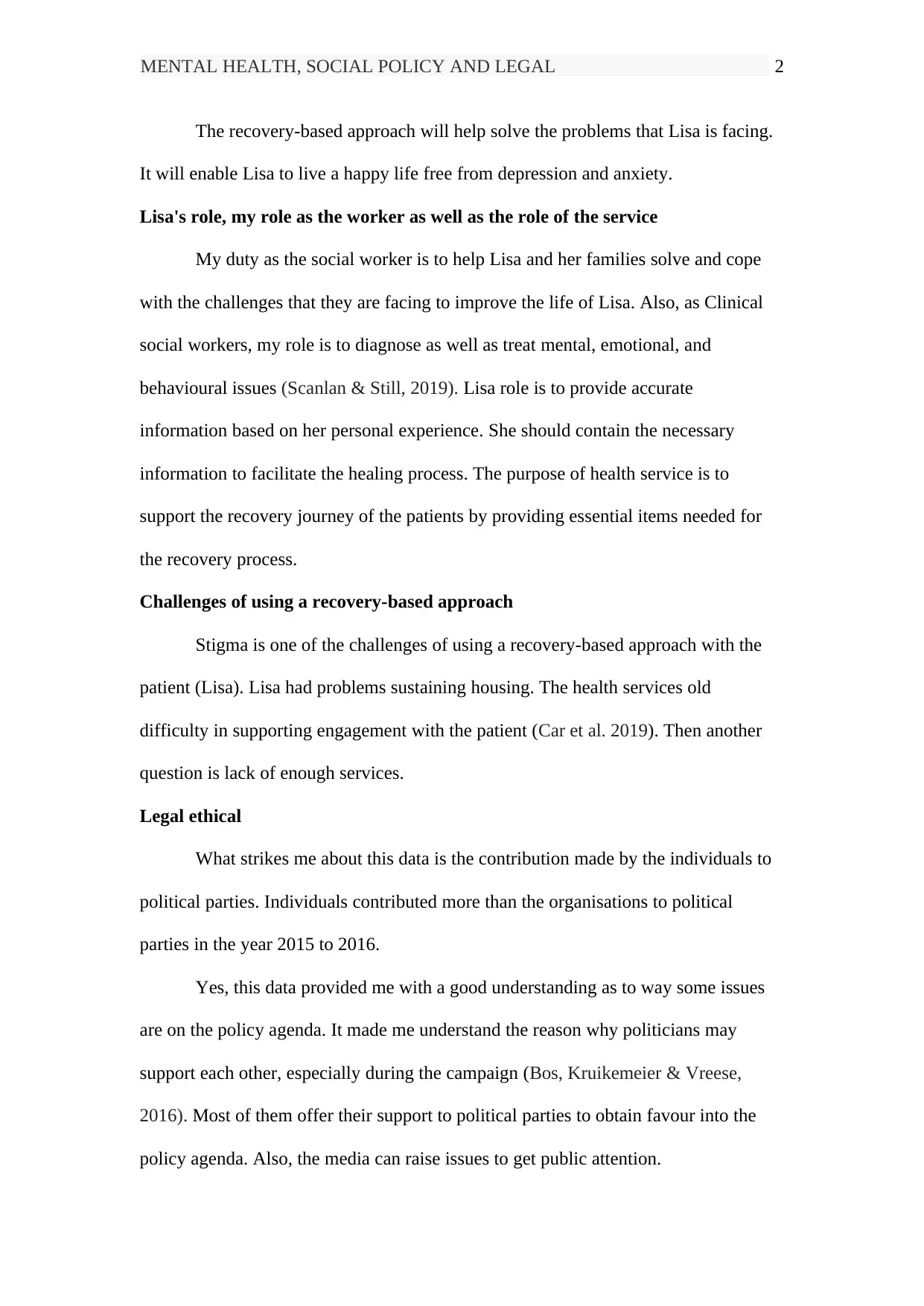
MENTAL HEALTH, SOCIAL POLICY AND LEGAL 2
The recovery-based approach will help solve the problems that Lisa is facing.
It will enable Lisa to live a happy life free from depression and anxiety.
Lisa's role, my role as the worker as well as the role of the service
My duty as the social worker is to help Lisa and her families solve and cope
with the challenges that they are facing to improve the life of Lisa. Also, as Clinical
social workers, my role is to diagnose as well as treat mental, emotional, and
behavioural issues (Scanlan & Still, 2019). Lisa role is to provide accurate
information based on her personal experience. She should contain the necessary
information to facilitate the healing process. The purpose of health service is to
support the recovery journey of the patients by providing essential items needed for
the recovery process.
Challenges of using a recovery-based approach
Stigma is one of the challenges of using a recovery-based approach with the
patient (Lisa). Lisa had problems sustaining housing. The health services old
difficulty in supporting engagement with the patient (Car et al. 2019). Then another
question is lack of enough services.
Legal ethical
What strikes me about this data is the contribution made by the individuals to
political parties. Individuals contributed more than the organisations to political
parties in the year 2015 to 2016.
Yes, this data provided me with a good understanding as to way some issues
are on the policy agenda. It made me understand the reason why politicians may
support each other, especially during the campaign (Bos, Kruikemeier & Vreese,
2016). Most of them offer their support to political parties to obtain favour into the
policy agenda. Also, the media can raise issues to get public attention.
The recovery-based approach will help solve the problems that Lisa is facing.
It will enable Lisa to live a happy life free from depression and anxiety.
Lisa's role, my role as the worker as well as the role of the service
My duty as the social worker is to help Lisa and her families solve and cope
with the challenges that they are facing to improve the life of Lisa. Also, as Clinical
social workers, my role is to diagnose as well as treat mental, emotional, and
behavioural issues (Scanlan & Still, 2019). Lisa role is to provide accurate
information based on her personal experience. She should contain the necessary
information to facilitate the healing process. The purpose of health service is to
support the recovery journey of the patients by providing essential items needed for
the recovery process.
Challenges of using a recovery-based approach
Stigma is one of the challenges of using a recovery-based approach with the
patient (Lisa). Lisa had problems sustaining housing. The health services old
difficulty in supporting engagement with the patient (Car et al. 2019). Then another
question is lack of enough services.
Legal ethical
What strikes me about this data is the contribution made by the individuals to
political parties. Individuals contributed more than the organisations to political
parties in the year 2015 to 2016.
Yes, this data provided me with a good understanding as to way some issues
are on the policy agenda. It made me understand the reason why politicians may
support each other, especially during the campaign (Bos, Kruikemeier & Vreese,
2016). Most of them offer their support to political parties to obtain favour into the
policy agenda. Also, the media can raise issues to get public attention.
Paraphrase This Document
Need a fresh take? Get an instant paraphrase of this document with our AI Paraphraser
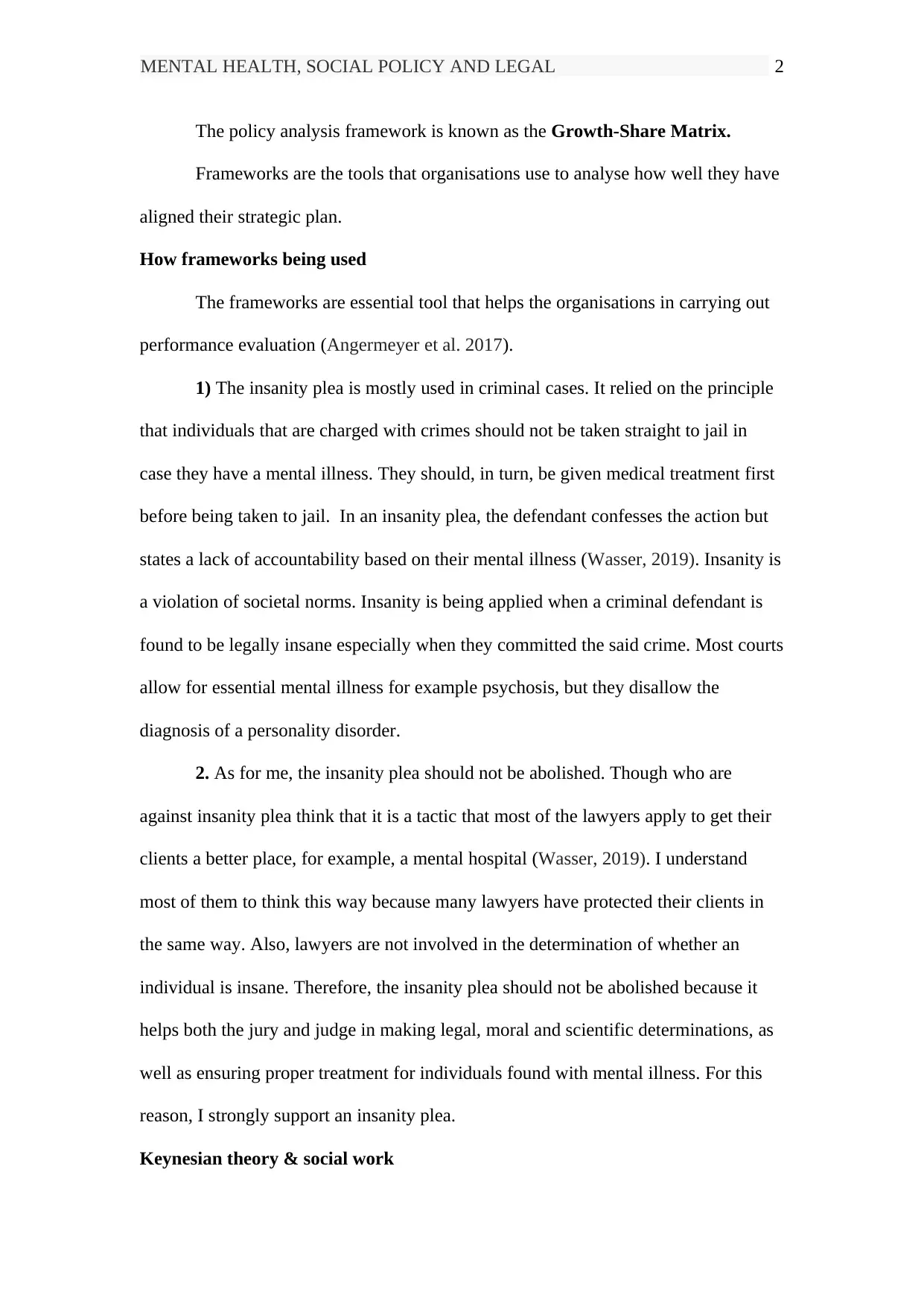
MENTAL HEALTH, SOCIAL POLICY AND LEGAL 2
The policy analysis framework is known as the Growth-Share Matrix.
Frameworks are the tools that organisations use to analyse how well they have
aligned their strategic plan.
How frameworks being used
The frameworks are essential tool that helps the organisations in carrying out
performance evaluation (Angermeyer et al. 2017).
1) The insanity plea is mostly used in criminal cases. It relied on the principle
that individuals that are charged with crimes should not be taken straight to jail in
case they have a mental illness. They should, in turn, be given medical treatment first
before being taken to jail. In an insanity plea, the defendant confesses the action but
states a lack of accountability based on their mental illness (Wasser, 2019). Insanity is
a violation of societal norms. Insanity is being applied when a criminal defendant is
found to be legally insane especially when they committed the said crime. Most courts
allow for essential mental illness for example psychosis, but they disallow the
diagnosis of a personality disorder.
2. As for me, the insanity plea should not be abolished. Though who are
against insanity plea think that it is a tactic that most of the lawyers apply to get their
clients a better place, for example, a mental hospital (Wasser, 2019). I understand
most of them to think this way because many lawyers have protected their clients in
the same way. Also, lawyers are not involved in the determination of whether an
individual is insane. Therefore, the insanity plea should not be abolished because it
helps both the jury and judge in making legal, moral and scientific determinations, as
well as ensuring proper treatment for individuals found with mental illness. For this
reason, I strongly support an insanity plea.
Keynesian theory & social work
The policy analysis framework is known as the Growth-Share Matrix.
Frameworks are the tools that organisations use to analyse how well they have
aligned their strategic plan.
How frameworks being used
The frameworks are essential tool that helps the organisations in carrying out
performance evaluation (Angermeyer et al. 2017).
1) The insanity plea is mostly used in criminal cases. It relied on the principle
that individuals that are charged with crimes should not be taken straight to jail in
case they have a mental illness. They should, in turn, be given medical treatment first
before being taken to jail. In an insanity plea, the defendant confesses the action but
states a lack of accountability based on their mental illness (Wasser, 2019). Insanity is
a violation of societal norms. Insanity is being applied when a criminal defendant is
found to be legally insane especially when they committed the said crime. Most courts
allow for essential mental illness for example psychosis, but they disallow the
diagnosis of a personality disorder.
2. As for me, the insanity plea should not be abolished. Though who are
against insanity plea think that it is a tactic that most of the lawyers apply to get their
clients a better place, for example, a mental hospital (Wasser, 2019). I understand
most of them to think this way because many lawyers have protected their clients in
the same way. Also, lawyers are not involved in the determination of whether an
individual is insane. Therefore, the insanity plea should not be abolished because it
helps both the jury and judge in making legal, moral and scientific determinations, as
well as ensuring proper treatment for individuals found with mental illness. For this
reason, I strongly support an insanity plea.
Keynesian theory & social work
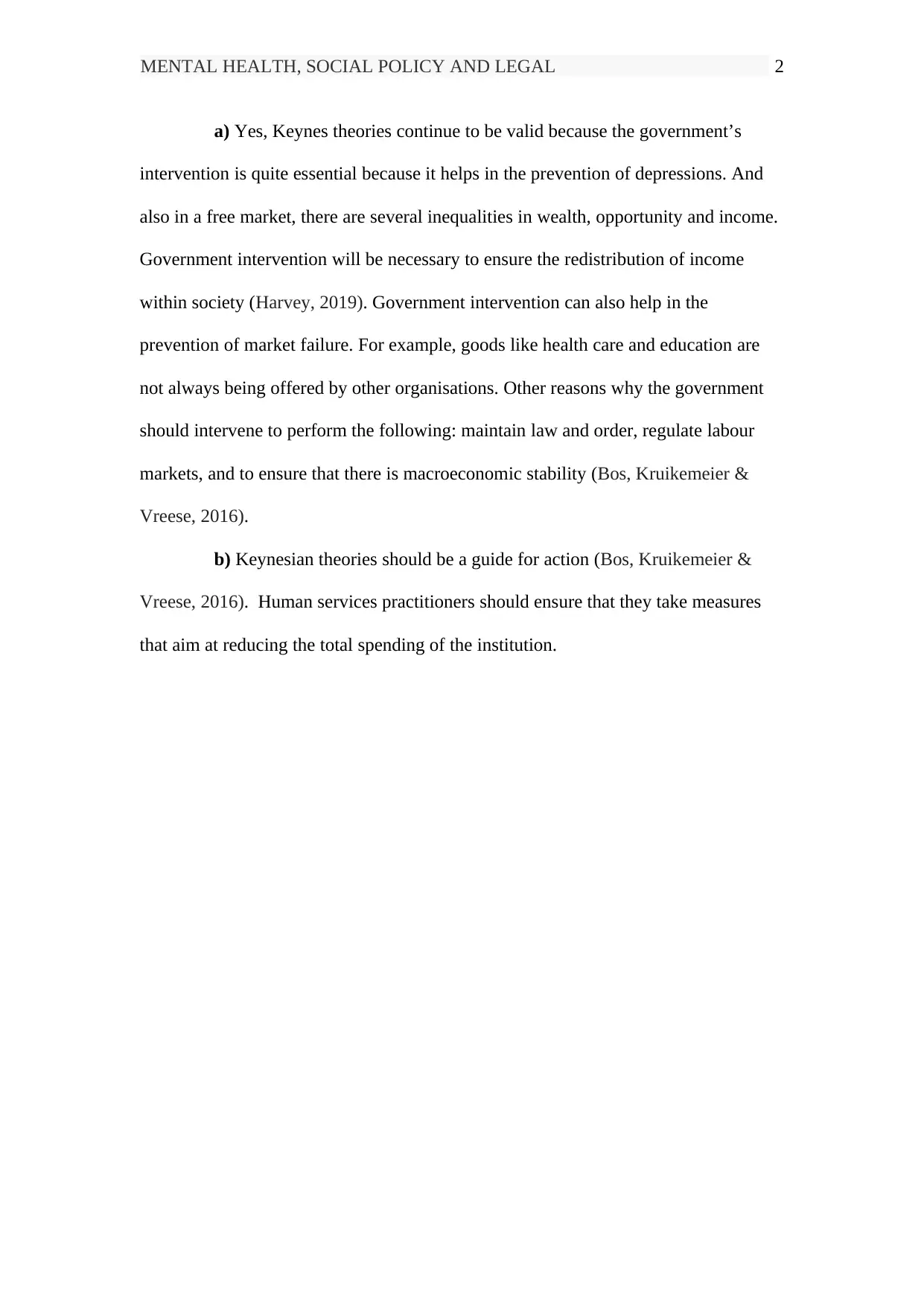
MENTAL HEALTH, SOCIAL POLICY AND LEGAL 2
a) Yes, Keynes theories continue to be valid because the government’s
intervention is quite essential because it helps in the prevention of depressions. And
also in a free market, there are several inequalities in wealth, opportunity and income.
Government intervention will be necessary to ensure the redistribution of income
within society (Harvey, 2019). Government intervention can also help in the
prevention of market failure. For example, goods like health care and education are
not always being offered by other organisations. Other reasons why the government
should intervene to perform the following: maintain law and order, regulate labour
markets, and to ensure that there is macroeconomic stability (Bos, Kruikemeier &
Vreese, 2016).
b) Keynesian theories should be a guide for action (Bos, Kruikemeier &
Vreese, 2016). Human services practitioners should ensure that they take measures
that aim at reducing the total spending of the institution.
a) Yes, Keynes theories continue to be valid because the government’s
intervention is quite essential because it helps in the prevention of depressions. And
also in a free market, there are several inequalities in wealth, opportunity and income.
Government intervention will be necessary to ensure the redistribution of income
within society (Harvey, 2019). Government intervention can also help in the
prevention of market failure. For example, goods like health care and education are
not always being offered by other organisations. Other reasons why the government
should intervene to perform the following: maintain law and order, regulate labour
markets, and to ensure that there is macroeconomic stability (Bos, Kruikemeier &
Vreese, 2016).
b) Keynesian theories should be a guide for action (Bos, Kruikemeier &
Vreese, 2016). Human services practitioners should ensure that they take measures
that aim at reducing the total spending of the institution.
⊘ This is a preview!⊘
Do you want full access?
Subscribe today to unlock all pages.

Trusted by 1+ million students worldwide
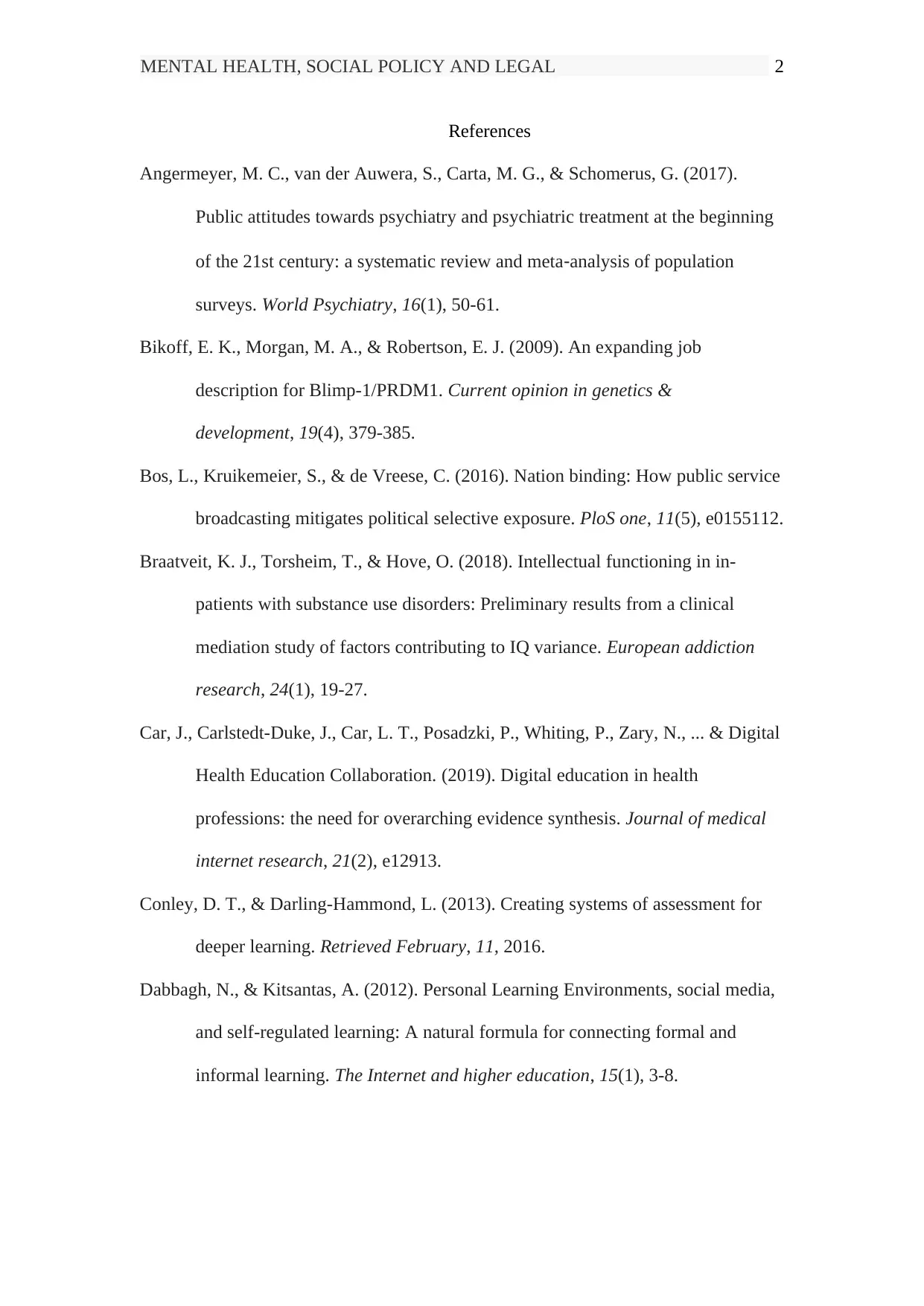
MENTAL HEALTH, SOCIAL POLICY AND LEGAL 2
References
Angermeyer, M. C., van der Auwera, S., Carta, M. G., & Schomerus, G. (2017).
Public attitudes towards psychiatry and psychiatric treatment at the beginning
of the 21st century: a systematic review and meta‐analysis of population
surveys. World Psychiatry, 16(1), 50-61.
Bikoff, E. K., Morgan, M. A., & Robertson, E. J. (2009). An expanding job
description for Blimp-1/PRDM1. Current opinion in genetics &
development, 19(4), 379-385.
Bos, L., Kruikemeier, S., & de Vreese, C. (2016). Nation binding: How public service
broadcasting mitigates political selective exposure. PloS one, 11(5), e0155112.
Braatveit, K. J., Torsheim, T., & Hove, O. (2018). Intellectual functioning in in-
patients with substance use disorders: Preliminary results from a clinical
mediation study of factors contributing to IQ variance. European addiction
research, 24(1), 19-27.
Car, J., Carlstedt-Duke, J., Car, L. T., Posadzki, P., Whiting, P., Zary, N., ... & Digital
Health Education Collaboration. (2019). Digital education in health
professions: the need for overarching evidence synthesis. Journal of medical
internet research, 21(2), e12913.
Conley, D. T., & Darling-Hammond, L. (2013). Creating systems of assessment for
deeper learning. Retrieved February, 11, 2016.
Dabbagh, N., & Kitsantas, A. (2012). Personal Learning Environments, social media,
and self-regulated learning: A natural formula for connecting formal and
informal learning. The Internet and higher education, 15(1), 3-8.
References
Angermeyer, M. C., van der Auwera, S., Carta, M. G., & Schomerus, G. (2017).
Public attitudes towards psychiatry and psychiatric treatment at the beginning
of the 21st century: a systematic review and meta‐analysis of population
surveys. World Psychiatry, 16(1), 50-61.
Bikoff, E. K., Morgan, M. A., & Robertson, E. J. (2009). An expanding job
description for Blimp-1/PRDM1. Current opinion in genetics &
development, 19(4), 379-385.
Bos, L., Kruikemeier, S., & de Vreese, C. (2016). Nation binding: How public service
broadcasting mitigates political selective exposure. PloS one, 11(5), e0155112.
Braatveit, K. J., Torsheim, T., & Hove, O. (2018). Intellectual functioning in in-
patients with substance use disorders: Preliminary results from a clinical
mediation study of factors contributing to IQ variance. European addiction
research, 24(1), 19-27.
Car, J., Carlstedt-Duke, J., Car, L. T., Posadzki, P., Whiting, P., Zary, N., ... & Digital
Health Education Collaboration. (2019). Digital education in health
professions: the need for overarching evidence synthesis. Journal of medical
internet research, 21(2), e12913.
Conley, D. T., & Darling-Hammond, L. (2013). Creating systems of assessment for
deeper learning. Retrieved February, 11, 2016.
Dabbagh, N., & Kitsantas, A. (2012). Personal Learning Environments, social media,
and self-regulated learning: A natural formula for connecting formal and
informal learning. The Internet and higher education, 15(1), 3-8.
Paraphrase This Document
Need a fresh take? Get an instant paraphrase of this document with our AI Paraphraser
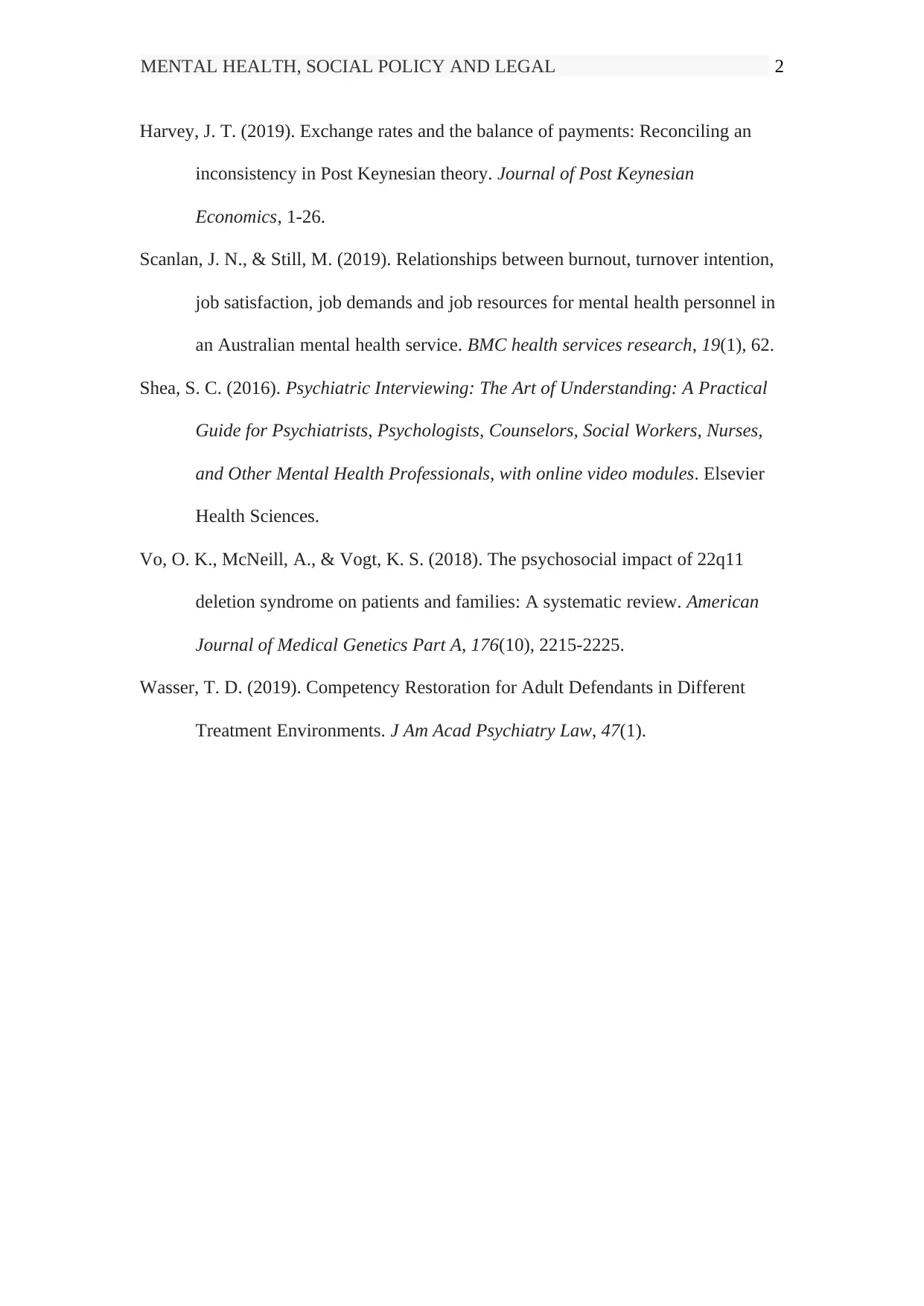
MENTAL HEALTH, SOCIAL POLICY AND LEGAL 2
Harvey, J. T. (2019). Exchange rates and the balance of payments: Reconciling an
inconsistency in Post Keynesian theory. Journal of Post Keynesian
Economics, 1-26.
Scanlan, J. N., & Still, M. (2019). Relationships between burnout, turnover intention,
job satisfaction, job demands and job resources for mental health personnel in
an Australian mental health service. BMC health services research, 19(1), 62.
Shea, S. C. (2016). Psychiatric Interviewing: The Art of Understanding: A Practical
Guide for Psychiatrists, Psychologists, Counselors, Social Workers, Nurses,
and Other Mental Health Professionals, with online video modules. Elsevier
Health Sciences.
Vo, O. K., McNeill, A., & Vogt, K. S. (2018). The psychosocial impact of 22q11
deletion syndrome on patients and families: A systematic review. American
Journal of Medical Genetics Part A, 176(10), 2215-2225.
Wasser, T. D. (2019). Competency Restoration for Adult Defendants in Different
Treatment Environments. J Am Acad Psychiatry Law, 47(1).
Harvey, J. T. (2019). Exchange rates and the balance of payments: Reconciling an
inconsistency in Post Keynesian theory. Journal of Post Keynesian
Economics, 1-26.
Scanlan, J. N., & Still, M. (2019). Relationships between burnout, turnover intention,
job satisfaction, job demands and job resources for mental health personnel in
an Australian mental health service. BMC health services research, 19(1), 62.
Shea, S. C. (2016). Psychiatric Interviewing: The Art of Understanding: A Practical
Guide for Psychiatrists, Psychologists, Counselors, Social Workers, Nurses,
and Other Mental Health Professionals, with online video modules. Elsevier
Health Sciences.
Vo, O. K., McNeill, A., & Vogt, K. S. (2018). The psychosocial impact of 22q11
deletion syndrome on patients and families: A systematic review. American
Journal of Medical Genetics Part A, 176(10), 2215-2225.
Wasser, T. D. (2019). Competency Restoration for Adult Defendants in Different
Treatment Environments. J Am Acad Psychiatry Law, 47(1).
1 out of 8
Related Documents
Your All-in-One AI-Powered Toolkit for Academic Success.
+13062052269
info@desklib.com
Available 24*7 on WhatsApp / Email
![[object Object]](/_next/static/media/star-bottom.7253800d.svg)
Unlock your academic potential
Copyright © 2020–2026 A2Z Services. All Rights Reserved. Developed and managed by ZUCOL.





